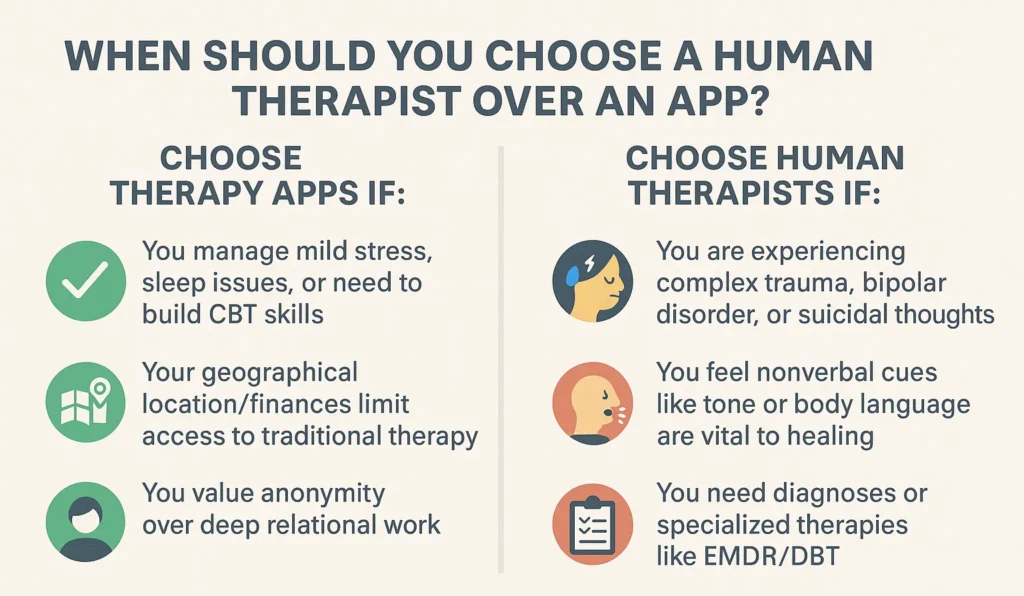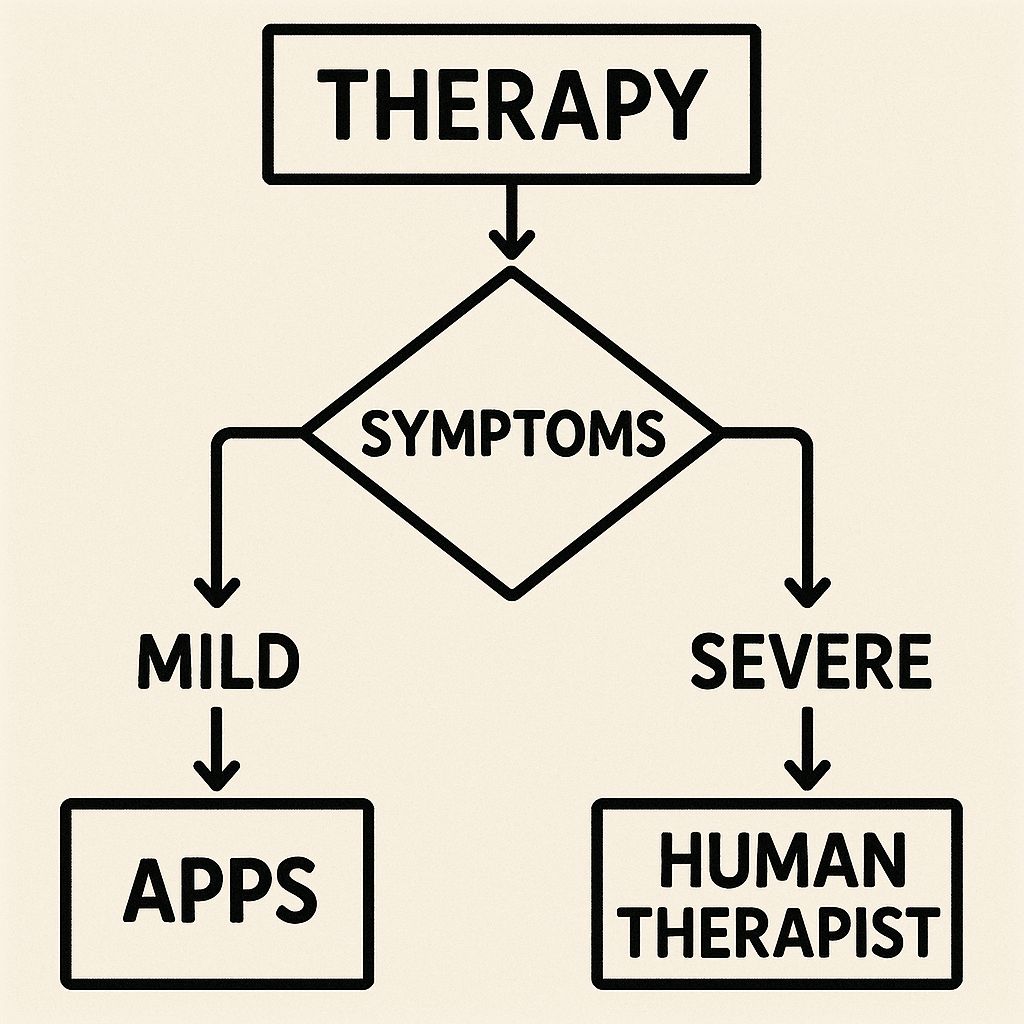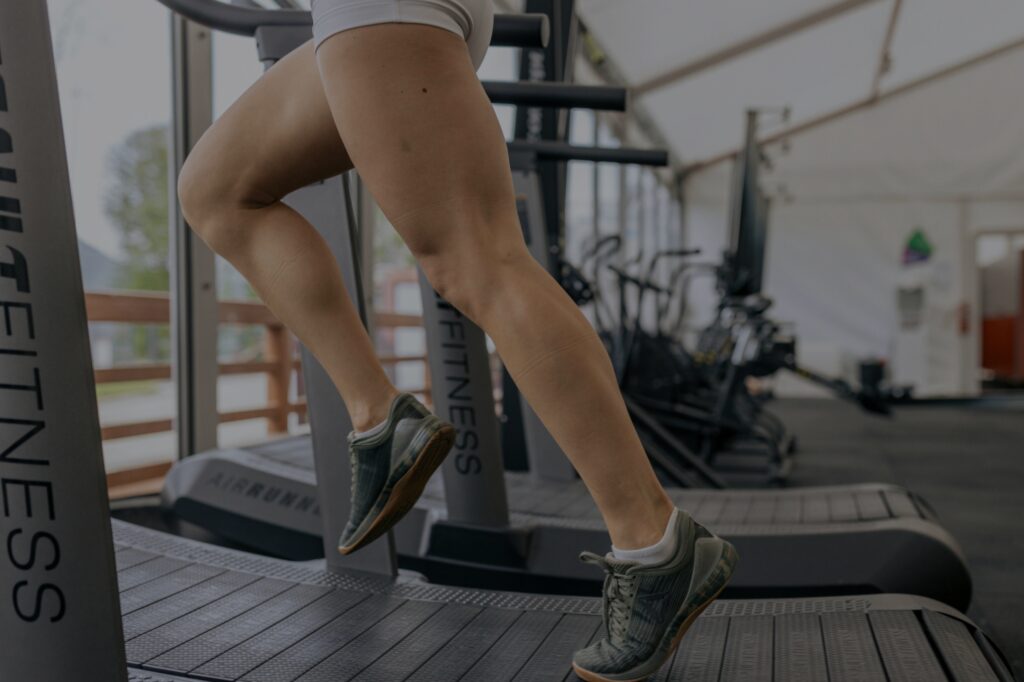Have you been awake at 3 AM, with anxiety tightening your chest? A human therapist sleeps miles away, but your phone glows with promise: “Talk now.” This is today’s mental health dilemma. With 1 in 8 people globally living with mental health disorders and therapist waitlists stretching months long in many areas, therapy apps have exploded as a 24/7 solution. But can algorithms truly replicate the healing power of human connection?

Table of Contents
Recent studies reveal a complex landscape. While app downloads skyrocket, research shows only 50% of therapy apps have clear privacy policies, and their effectiveness varies dramatically based on your condition and needs. Let’s navigate this digital therapy revolution together.
How Do AI Chatbots Compare to Human Therapists?
Not all “therapy apps” are created equally. Understanding these categories is very crucial in helping you maximise their benefits:
1. AI Chatbots (e.g. Serena, Woebot)
- It uses an algorithm to generate its conversations using CBT or mindfulness techniques
- it is available 24/7 via chat/voice (e.g. Serena operates through WhatsApp)
- Cost: $0-$29/month (often credit-based)
2. Teletherapy Platforms (e.g. BetterHelp, Talkspace)
- There is a feature of video/chat sessions with licensed human therapists on teletherapy platforms
- They typically have $60-$130/week with subscription models
- Android downloads: 500,000+ for top platforms
3. Self-Help Tools (e.g. Headspace, PTSD Coach)
- Skill-building modules for specific issues (insomnia, trauma)
- Often free or low-cost ($10-$15/month)
- Effectiveness: Highest for mild symptom management
What Science Says About Therapy Apps Effectiveness
Table: Evidence Recommendations Based on Condition
| Condition | Therapy Apps | Human Therapists |
| Mild depression | Equivalent to CBT | High efficacy |
| Severe OCD | Limited evidence | Gold standard |
| Relationship issues | Helpful (e.g ReGain) | Deeper relational work |
| Crisis situations | Risk of delays | Immediate Intervention |

Where Apps Work Best:
- Accessibility: 24/7 support bridges gaps for rural users and those with mobility limitations
- Affordability: $60-$100/week vs. $150+/session for traditional therapy
- Mild-to-Moderate Issues: 2025 Dartmouth trials show AI bots matching human efficacy for anxiety/depression with clinical oversight
Where Human Therapists Dominate:
- Therapeutic Alliance: The 1 predictor of success—built through trust, empathy, and nuanced responses to body language
- Complex Conditions: PTSD, bipolar disorder, and personality disorders require personalized interventions apps can’t provide
- Crisis Care: Real therapists assess risk factors and coordinate care during emergencies
"Apps excel in accessibility, but human therapists excel in connection, especially when wounds run deep."
Privacy Concerns: Are Therapy Apps Safe?
⚠️ Privacy Trade-Offs
- 50% of mental health apps lack clear privacy policies
- User data from apps like BetterHelp has been shared with advertisers (2023 FTC settlement)
⏳ The Engagement Challenge
- “Bot fatigue” causes 80% of app users to disengage within 30 days (2024 JAMA study)
- Without human accountability, motivation often falters.
🧠 The Human Element Gap
- Apps struggle with therapeutic “rupture and repair” and that is the critical moment when misunderstandings become breakthroughs.
- As one user shared: “My app therapist told me to seek actual therapy during its breakdown”.
When Should You Choose a Human Therapist Over an App?

✅ Choose Therapy Apps If:
- You manage mild stress or sleep issues, or you need to build CBT skills.
- Your geographical location/finances limit you in having access to traditional therapy.
- You are someone that values anonymity over deep relational work
🧑⚕️ Choose Human Therapists If:
- You are experiencing complex trauma, bipolar disorder, or suicidal thoughts.
- You felt some nonverbal cues like tone or body language feel vital to your healing process.
- You need diagnoses or specialized therapies like EMDR/DBT
🔁 Hybrid Therapy: Combining Apps With Real Person Sessions
- Use apps between sessions: Apps like symptom trackers (e.g. CBT Thought Diary) provide insights for your therapist. To know more and be able to help you further.
- Supplement with skill builders: Try mindfulness apps like Headspace while doing trauma work with a human therapist.
Weekly in person therapy + Serena for anxiety management will also be a good combo.
The Future of Mental Health: AI as a Therapist’s Assistant
Emerging 2025 models show promise when AI assists human therapists:
- AI scribes automate session notes, letting therapists focus on you. He doesn’t have to split his attention, trying to jot down and also to focus on you.
- Voice biomarkers have the capacity to detect depression severity from speech patterns. Experts can also do this but many things can hinder a human therapist from detecting such.
- Hybrid platforms like Octave offer therapists and digital tools in 40+ languages
Having all these benefits in therapist apps does not cancel out some ethical concerns that still exist. Therapist burnout spikes when platform clinicians juggle 100+ clients, and most apps lack FDA oversight.
Conclusion
Therapy apps are extraordinary tools but not miracle tools. They democratise access for millions who’d otherwise suffer silently, offering affordable support without any stigma. Yet for wounds that reshape lives, human hands still heal what code cannot touch.
"Use apps for skills, but seek humans for transformation. Your deepest healing deserves eyes that witness, voices that comfort, and presence that algorithms can not replicate."
FAQs
Is online therapy expensive?
No, some apps average $60-$100/week vs. $150+/session for therapists. But verify if your insurance covers either option, as many now cover teletherapy
Can apps handle panic attacks or suicidal thoughts?
No. Apps lack crisis protocols. Call 988 or seek emergency care immediately. Human therapists coordinate interventions during emergencies
How do I verify if a therapy app is credible?
Check for:
– Licensed therapists (for teletherapy apps)
– Clear privacy policies
– Evidence based techniques (CBT, DBT)
Avoid apps making diagnostic claims
Disadvantages of online therapy?
Privacy concerns, lack of human connection, and limited crisis intervention are key risks in using online therapy
Can I use both simultaneously?
Absolutely! Many use apps like Wysa for daily mood tracking while seeing a human therapist weekly. Inform both providers about your integrated approach


